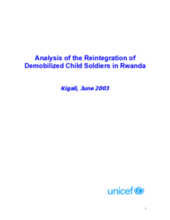Between 2001 and 2003, 360 former Rwandan child soldiers were reintegrated into their communities. One of the most important lessons learned by those working with Demobilized child soldiers (DCS) is the need for follow up with the children after they have been reintegrated. To this end, UNICEF and Save the Children (UK) committed to following up with all of the reintegrated child soldiers through their Baratashye (“going home” in Kinyarwanda) project.
Baratashye is a project aimed at the follow up and support of the demobilized child soldiers after they have been reintegrated into their communities. The goal of this project is “To facilitate the successful reintegration of demobilized child soldiers, including girls, into their communities through the provision of targeted interventions for all vulnerable children in education, skills training and community capacity development.” In order to achieve this goal UNICEF and Save the Children UK began in 2002 to visit the children who had been demobilized and their communities.
One of the stated objectives of the project was “to develop a greater understanding of the most effective interventions to meet the needs…of returning DCS.” The current report addresses this objective, using statistical analyses of the data collected by the Save the Children UK social workers during their follow up interviews to examine the situation of the children who have been demobilized and to determine some factors that contribute to successful (versus unsuccessful) reintegration into communities of origin. This report also provides general information about the economic and psychosocial status of children in order to better understand their experiences and their current situation. It is hoped that the information will help to improve programs for future DCS who are reintegrated into their communities.
©UNICEF

